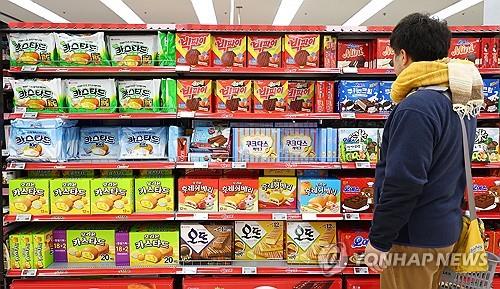- California Assembly OKs highest minimum wage in nation
- S. Korea unveils first graphic cigarette warnings
- US joins with South Korea, Japan in bid to deter North Korea
- LPGA golfer Chun In-gee finally back in action
- S. Korea won’t be top seed in final World Cup qualification round
- US men’s soccer misses 2nd straight Olympics
- US back on track in qualifying with 4-0 win over Guatemala
- High-intensity workout injuries spawn cottage industry
- CDC expands range of Zika mosquitoes into parts of Northeast
- Who knew? ‘The Walking Dead’ is helping families connect
S. Korea to operate consumer report center on ‘shrinkflation’ practices
The government will set up a center to receive consumers’ reports about corporate downsizing of products while maintaining prices without notice as part of efforts to better protect the people’s rights and ease their burdens amid high inflation, the antitrust regulator said Wednesday.
There have been growing public complaints about “shrinkflation” practices, where companies reduce the quantity of their products without a corresponding price fall, shifting a rise in production costs to consumers while the consumers remain unaware of such a shift.
The center will be set up under the Korea Consumer Agency to begin operations Thursday and will be tasked with collecting information from customers about companies using shrinkflation tactics and affected products, according to the Fair Trade Commission (FTC).
Based on the reports and the results of the ongoing survey, the government plans to come up with detailed measures.
The government is looking into 209 processed food and other daily items of 73 kinds for possible shrinkflation cases, and the results are expected to be available early next month, it added.
“Shrinkflation practices are deceptive, as they constitute effective price increases while consumers mostly remain unaware. It is a serious issue that could hurt consumer confidence in the market,” FTC Vice Chair Cho Hong-sun said.
In addition to policy responses, the government will seek to sign an agreement with companies that calls for their voluntary notice about smaller volume or a price increase, he added.
Under the current law, shrinkflation practices are not illegal.
South Korea is still struggling with high inflationary pressure despite a gradual downtrend this year.
Consumer prices, a key gauge of inflation, decreased by a yearly low of 2.3 percent on-year in July but rose 3.4 percent in August, 3.7 percent in September and 3.8 percent last month, according to government data.
The finance ministry has said that inflation is forecast to be eased at a slower pace than earlier expected and vowed efforts to bring prices under control.












